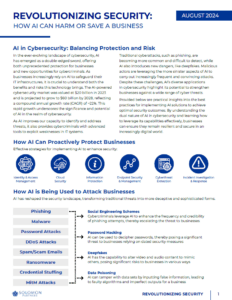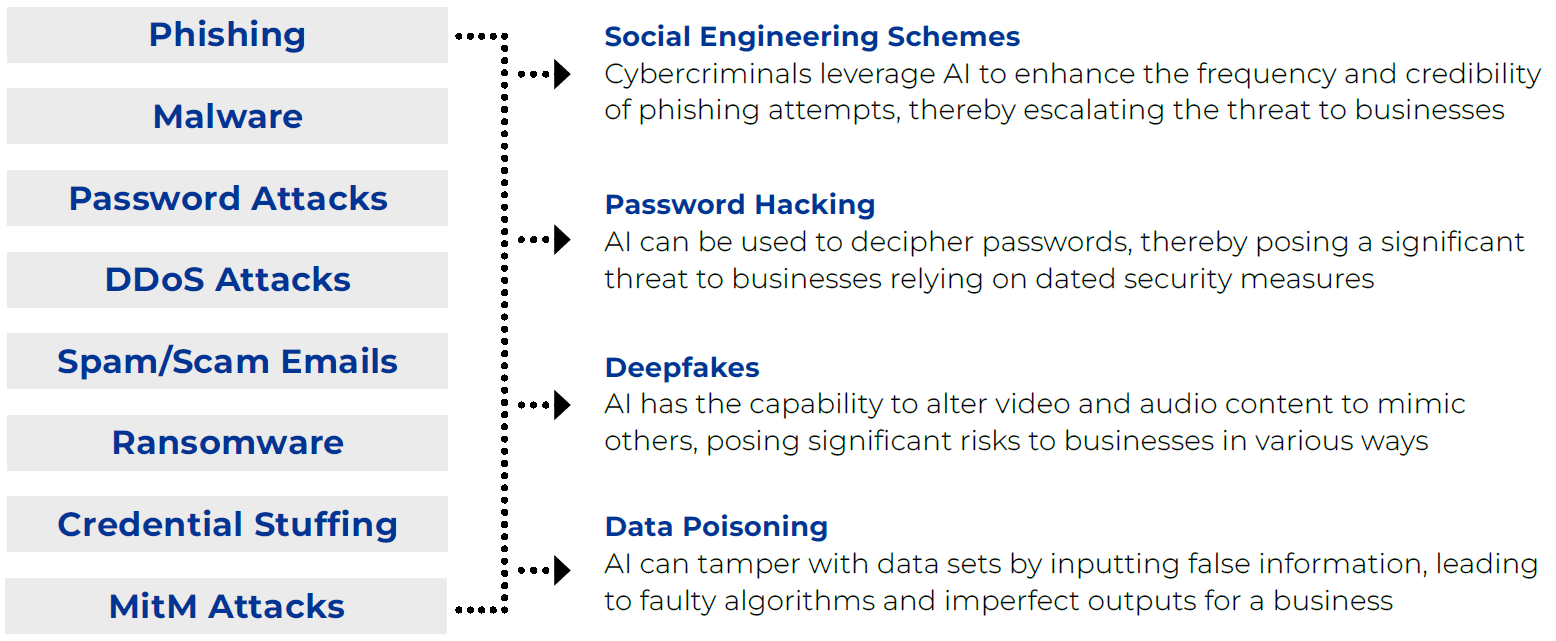Revolutionizing Security: How AI Can Harm or Save a Business
 AI in Cybersecurity: Balancing Protection and Risk
AI in Cybersecurity: Balancing Protection and Risk
In the ever-evolving landscape of cybersecurity, AI has emerged as a double-edged sword, offering both unprecedented protection for businesses and new opportunities for cybercriminals. As businesses increasingly rely on AI to safeguard their IT infrastructures, it is crucial to understand both the benefits and risks this technology brings. The AI-powered cybersecurity market was valued at $20 billion in 2023 and is projected to grow to $60 billion by 2028, reflecting a compound annual growth rate (CAGR) of ~22%. This rapid growth underscores the significance and potential of AI in the realm of cybersecurity.
As AI improves our capacity to identify and address threats, it also provides cybercriminals with advanced tools to exploit weaknesses in IT systems.
Traditional cyberattacks, such as phishing, are becoming more common and difficult to detect, while AI also introduces new dangers, like deepfakes. Malicious actors are leveraging the more sinister aspects of AI to carry out increasingly frequent and convincing attacks. Despite these challenges, AI’s diverse applications in cybersecurity highlight its potential to strengthen businesses against a wide range of cyber threats.
Provided below are practical insights into the best practices for implementing AI solutions to achieve optimal security outcomes. By understanding the dual nature of AI in cybersecurity and learning how to leverage its capabilities effectively, businesses can ensure they remain resilient and secure in an increasingly digital world.
How AI Can Proactively Protect Businesses
Effective strategies for implementing AI to enhance security:

How AI is Being Used to Combat Businesses
AI has reshaped the security landscape, transforming traditional threats into more deceptive and sophisticated forms.

Navigating the Continuous Cycle of Threats and Defenses
The cybersecurity landscape is a relentless race between cybercriminals using AI to create new threats and businesses employing AI to defend against them. This cycle of innovation, driven by AI-powered threats and subsequent adaptive defenses, perpetuates as each advancement leads to new vulnerabilities. At the center of this dynamic is AI, making it crucial for businesses to stay ahead by continually evolving their cybersecurity strategies. This ongoing battle will drive demand for high-quality solutions in cloud security, vulnerability analysis, fraud detection, and other third-party, AI-powered security tools, emphasizing the need for continuous innovation and robust protection.
The vulnerabilities that AI introduces strengthen the argument for companies to prioritize its implementation in their own security strategies. By strategically integrating AI and selecting the highest- quality vendors and third-party solutions, businesses can mitigate these risks. Additionally, using high-quality data sets to train AI systems ensures robust performance and enhanced security. Companies can leverage AI in cybersecurity primarily through four applications (see below). AI is therefore able to identify potential threats and vulnerabilities before they are exploited, allowing for proactive measures to safeguard critical systems and information.
Threat Monitoring
AI-powered security solutions provide continuous monitoring of threats, significantly reducing the need for human hours and minimizing human error while also automating administrative IT tasks
Behavioral Analysis
AI can be leveraged to analyze vast data sets quickly, detecting patterns that indicate potential threats, thereby reducing detection time and minimizing the chance of overlooking threats
Vulnerability Management
AI can be utilized to detect weak points in IT systems and proactively offer solutions to fix them, preventing potential threats from capitalizing on vulnerabilities
Fraud Detection
AI can be used to parse through extensive financial records to identify cases of potential fraud, helping to prevent such occurrences in the future
Outlook
As AI reshapes the cybersecurity landscape, businesses must balance its protective benefits with potential risks. Staying informed about advancements and strategically implementing AI can enhance security while mitigating vulnerabilities. A balanced approach to AI ensures resilience in an evolving digital world. Companies should develop comprehensive AI-driven cybersecurity strategies to harness AI’s full potential to protect assets and keep up with cybercriminals. Continuous adaptation and vigilance are key to achieving optimal security outcomes and robust
defenses against emerging threats.



